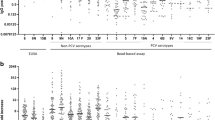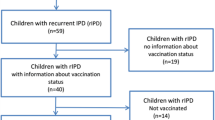Abstract
Measurement of pre- and post-pneumococcal antibody levels after immunization with the 23-valent capsular polysaccharide pneumococcal vaccine (23vPPV) is indicative of a T-independent antibody response. The World Health Organisation ELISA is considered gold standard yet is labor-intensive and technically difficult to perform. Interpretation criteria defining an adequate response to 23vPPV remain controversial. The diagnostic Immunology Laboratory at The Royal Children’s Hospital, Melbourne (RCH), performs an in-house multi-serotype automated ELISA. The primary objective of this study was to verify RCH interpretation criteria for the laboratory’s automated ELISA. Forty pneumococcal conjugate vaccine (PCV)–naïve healthy adults aged 18 to 25 years and 22 PCV-primed healthy children aged 2 to 5 years were immunized with 23vPPV. A serum sample was collected immediately prior and 28 to 42 (± 7) days post immunization. Samples were analyzed on the Tecan Freedom Evo 200 ELISA with adequate response defined as post-immunization antibody level of 1.3 µg/mL or fourfold rise from baseline in ≥ 10/15 serotypes in adult participants and ≥ 4/8 serotypes in pediatric participants. Thirty-nine (97.5%) adults and 22 (100%) children achieved an adequate response to 23vPPV. In PCV-naïve adults, serotypes contained within the conjugate vaccines were less immunogenic, with 12 (30%) adults not achieving an adequate antibody response when only PCV serotypes were used for interpretation. Our diagnostic laboratory has verified the interpretation criteria used for an automated multi-serotype pneumococcal ELISA method. Clinical Trial Registration: ANZCTR registration number ACTRN12618000822280.



Similar content being viewed by others
Data Availability
The datasets generated during the current study are available from the corresponding author on reasonable request.
Code Availability
Not applicable.
References
Bonilla FA, Khan DA, Ballas ZK, et al. Practice parameter for the diagnosis and management of primary immunodeficiency. J Allergy Clin Immunol. 2015;136:1186-1205.e78.
Orange JS, Ballow M, Stiehm ER, et al. Use and interpretation of diagnostic vaccination in primary immunodeficiency: a working group report of the Basic and Clinical Immunology Interest Section of the American Academy of Allergy, Asthma & Immunology. J Allergy Clin Immunol. 2012;130:S1–24.
Koskela M. Serum antibodies to pneumococcal C polysaccharide in children: response to acute pneumococcal otitis media or to vaccination. Pediatr Infect Dis J. 1987;6:519–26.
Coughlin RT, White AC, Anderson CA, Carlone GM, Klein DL, Treanor J. Characterization of pneumococcal specific antibodies in healthy unvaccinated adults. Vaccine. 1998;16:1761–7.
Concepcion NF, Frasch CE. Pneumococcal type 22F polysaccharide absorption improves the specificity of a pneumococcal-polysaccharide enzyme-linked immunosorbent assay. Clin Diagn Lab Immunol. 2001;8:266–72.
Sorensen RU. A critical view of specific antibody deficiencies. Front Immunol. 2019;10:986.
Meek B, Ekström N, Kantsø B, et al (2019) Multilaboratory comparison of pneumococcal multiplex immunoassays used in immunosurveillance of streptococcus pneumoniae across Europe. mSphere. https://doi.org/10.1128/mSphere.00455-19
Hajjar J, Al-Kaabi A, Kutac C, Dunn J, Shearer WT, Orange JS. Questioning the accuracy of currently available pneumococcal antibody testing. J Allergy Clin Immunol. 2018;142:1358–60.
Whaley MJ, Rose C, Martinez J, et al. Interlaboratory comparison of three multiplexed bead-based immunoassays for measuring serum antibodies to pneumococcal polysaccharides. Clin Vaccine Immunol. 2010;17:862–9.
Daly TM, Pickering JW, Zhang X, Prince HE, Hill HR. Multilaboratory assessment of threshold versus fold-change algorithms for minimizing analytical variability in multiplexed pneumococcal IgG measurements. Clin Vaccine Immunol. 2014;21:982–8.
Zhang X, Simmerman K, Yen-Lieberman B, Daly TM. Impact of analytical variability on clinical interpretation of multiplex pneumococcal serology assays. Clin Vaccine Immunol. 2013;20:957–61.
Sorensen RU, Leiva LE, Javier FC, Sacerdote DM, Bradford N, Butler B, Giangrosso PA, Moore C. Influence of age on the response to Streptococcus pneumoniae vaccine in patients with recurrent infections and normal immunoglobulin concentrations. J Allergy Clin Immunol. 1998;102:215–21.
Kamchaisatian W, Wanwatsuntikul W, Sleasman J, Tangsinmankong N. Validation of current joint American Academy of Allergy, Asthma & Immunology and American College of Allergy, Asthma and Immunology guidelines for antibody response to the 23-valent pneumococcal vaccine using a population of HIV-infected children. J Allergy Clin Immunol. 2006;118:1336–41.
Anonymous. Pneumococcal conjugate vaccines in infants and children under 5 years of age: WHO position paper – February 2019. Wkly Epidemiol Rec. 2019;94:85–104.
Beck SC. Making sense of serotype-specific pneumococcal antibody measurements. Ann Clin Biochem. 2013;50:517–9.
Go E, Ballas Z. Anti-pneumococcal antibody response in normal subjects: a meta-analysis. J Allergy Clin Immunol. 1996;98:205–15.
Gary L. Horowitz, Sousan Altaie, James C. Boyd, Ferruccio Ceriotti, Uttam Garg, Paul Horn, Amadeo Pesce, Harrison E. Sine, Jack Zakowski (2010) Defining, establishing, and verifying reference intervals in the Clinical Laboratory; Approved Guideline—Third Edition.
Uddin S, Borrow R, Haeney MR, Moran A, Warrington R, Balmer P, Arkwright PD. Total and serotype-specific pneumococcal antibody titres in children with normal and abnormal humoral immunity. Vaccine. 2006;24:5637–44.
Park MA, Jenkins SM, Smith CY, Pyle RC, Sacco KA, Ryu E, Hagan JB, Joshi AY, Snyder MR, Abraham RS. Pneumococcal serotype-specific cut-offs based on antibody responses to pneumococcal polysaccharide vaccination in healthy adults. Vaccine. 2021;39:2850–6.
H Schaballie B Bosch R Schrijvers et al 2017 Fifth percentile cutoff values for antipneumococcal polysaccharide and anti-salmonella typhi Vi IgG describe a normal polysaccharide response Front Immunol https://doi.org/10.3389/fimmu.2017.00546
Hare ND, Smith BJ, Ballas ZK. Antibody response to pneumococcal vaccination as a function of preimmunization titer. J Allergy Clin Immunol. 2009;123:195–200.
Park S, Nahm MH. Older adults have a low capacity to opsonize pneumococci due to low IgM Antibody response to pneumococcal vaccinations. Infect Immun. 2011;79:314–20.
Chiarella SE, Jenkins SM, Park MA, Abraham RS, Joshi AY. Sex differences in antibody responses to the 23-valent pneumococcal polysaccharide vaccination. Ann Allergy Asthma Immunol. 2021;127:509–10.
D LaFon Y Kim R Burton M Dransfield M Nahm 2021 Pneumococcal antibody function for immunologic evaluation: normal results in older adults, and a novel analytical model for vaccine response J ClinImmunol https://doi.org/10.1007/s10875-021-01126-z
U.S. Food and Drug Administration, Centre for Biologics Evaluation and Research (2021) July 16, 2021 - Approval Letter - VAXNEUVANCE.
U.S. Food and Drug Administration, Centre for Biologics Evaluation and Research (2021) June 10, 2021 Approval Letter - PREVNAR 20.
Evans C, Bateman E, Steven R, et al. Measurement of typhi Vi antibodies can be used to assess adaptive immunity in patients with immunodeficiency. Clin Exp Immunol. 2018;192:292–301.
Acknowledgements
We would like to thank Sonja Elia at RCH Immunisation Service for her support of this study.
Funding
This work was supported by The RCH Foundation.
Author information
Authors and Affiliations
Contributions
Laine Hosking, Sharon Choo, Kirsten Perrett and Stephanie Richards contributed to study conception and design. Christine Czjako and Marilyn Clark designed the automated ELISA and Sinead Flynn performed the experiments. Laine Hosking analyzed the data. The first draft of the manuscript was written by Laine Hosking and Sharon Choo and all authors commented on previous versions of the manuscript. All authors read and approved the final manuscript.
Corresponding author
Ethics declarations
Ethics Approval
This study was performed in line with the Australian National Statement on Ethical Conduct in Human Research. Approval was granted by the Royal Children’s Hospital Human Research Ethics Committee (protocol number 37183).
Consent to Participate
Informed consent was obtained from all individual participants or their guardians included in the study.
Consent for Publication
Not applicable, no individual data included in the manuscript.
Conflict of Interest
The authors declare no competing interests.
Additional information
Publisher’s Note
Springer Nature remains neutral with regard to jurisdictional claims in published maps and institutional affiliations.
Appendices
Appendix
Appendix 1. Inclusion and exclusion criteria
Inclusion Criteria
Each adult must meet all of the following criteria to be enrolled in this study:
-
Is between the ages of 18 and 25 years at the time of enrolment
-
Is capable of understanding the informed consent document and providing consent
-
Is available to attend the study follow-up
Each child must meet all of the following criteria to be enrolled in this study:
-
Is between the ages of 2 and 5 years at the time of enrolment
-
Has received Prevenar13 as per the Australian National Immunisation Program Schedule at 2-, 4-, and 6 months of age
-
Has a legally acceptable representative capable of understanding the informed consent document and providing consent on the participant’s behalf
-
Is available to attend the study follow-up
Exclusion criteria
Participants meeting any of the following criteria will be excluded from the study:
-
Prior immunization with 23vPPV
-
Has a known hypersensitivity to any of the components of the 23vPPV vaccine
-
Has a current fever or infection
-
Is taking immunosuppressant medication, e.g. oral corticosteroids
-
Has a prior diagnosis of invasive pneumococcal infection
-
Has a pre-existing medical condition associated with increased risk of invasive pneumococcal disease
-
Is currently pregnant, or considering pregnancy during the study period
-
Is known to require a pneumococcal immunization prior to the completion of the study follow-up
-
Inability or unwillingness of participant or legally acceptable representative to give written informed consent
In addition, for adult participants, the following exclusion criteria apply:
-
Prior immunization with a pneumococcal conjugate vaccine
Appendix 2
Rights and permissions
About this article
Cite this article
Hosking, L.M., Perrett, K.P., Czajko, C. et al. Pneumococcal IgG Antibody Responses to 23vPPV in Healthy Controls Using an Automated ELISA. J Clin Immunol 42, 760–770 (2022). https://doi.org/10.1007/s10875-022-01230-8
Received:
Accepted:
Published:
Issue Date:
DOI: https://doi.org/10.1007/s10875-022-01230-8




